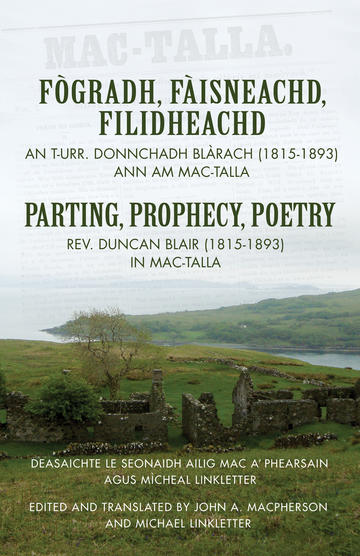Rev. Duncan B. Blair (1815-1893) was an excellent linguist, a good poet and a devout man. “As an accurate writer of Gaelic he had no superior,” espoused A. Maclean Sinclair. Blair composed sacred and secular poems, laments and songs and prose, many of which were published in Mac-Talla, the famous Gaelic newspaper published in Sydney, Nova Scotia. Among his contributions to Mac-Talla were a series of essays on the Highland Clearances. Blair’s poems have been studied and presented elsewhere over the years, but less is known about his prose.
Now, transcribed in the original Gaelic with English translations, Fògradh, Fàisneachd, Filidheachd / Parting, Prophecy, Poetry includes Blair’s articles about the Clearances, an account of a 16th-century seer who some say foretold of the Clearances, essays about Blair’s travels around the Maritimes and Ontario and a number of his poems, all as published in Mac-Talla.
Born in 1815 in Strachur, Argyllshire, Rev. Duncan B. Blair moved in early childhood to the Ardgour area and subsequently to Badenoch. He entered Divinity Hall in Edinburgh in 1840 and was licensed to preach in 1844. He was in Mull in 1845, but moved to Pictou, Nova Scotia, the following year. He was in Ontario from May 1847 to October 1848. He returned to Scotland and married Mary Sibella MacLean in 1851, then came back to Canada as minister of the Presbyterian congregation of Barney’s River and Blue Mountain, Pictou County. He died in 1893. Alexander MacLean Sinclair described Blair as “an excellent linguist, a good poet, and a devout man. As an accurate writer of Gaelic he had no superior.” In Gaelic, Blair composed sacred poems, laments and secular poems and songs, totalling some 16,650 lines. His contribution to Mac-Talla was extensive during a short period of time.
John Alick Macpherson is a native Gaelic speaker from Harris and North Uist, Scotland, and he currently lives near Sydney, Nova Scotia. Educated at Edinburgh and Jordanhill College of Education, where he trained as a teacher of Gaelic and history, he taught Gaelic in the Scottish school system. John Alick also worked for the Gaelic Department of the BBC as a producer, and was deputy director of the Gaelic Broadcasting Committee and has been involved in many Gaelic activities including being on the board of the Gaelic Books Council. He was also the Chairman of the Scottish Government task force whose findings led to the Gaelic Language Act. Other Gaelic activities include writing columns for the Gaelic newspaper An Gaidheal Ùr and the Gaelic magazine An Gath, preparation of Gaelic language plans, and the translation into Gaelic of complex documents for several Scottish organizations.
Michael D. Linkletter, PhD is Chair of Celtic Studies at St. Francis Xavier University in Antigonish, Nova Scotia, and an expert on the writings of Rev. Duncan Blair and A. Maclean Sinclair. His PhD in Celtic Languages and Literatures is from Harvard University. He has also studied Gaelic at Sabhal Mòr Ostaig in Scotland, and piping at the Gaelic College in Cape Breton. In addition to teaching Gaelic courses at St. FX University, he has taught Gaelic for the Atlantic Gaelic Academy for a number of years, and has also taught Gaelic at Harvard University.
- Age:
- 16 to 18
- Grade:
- 11 to 12



